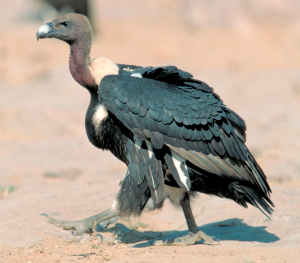![By Lord Mountbatten (Own work) [Public domain], via Wikimedia Commons](https://markavery.info/wp-content/uploads/2012/10/800px-7.5_Cartridges-300x225.jpg)
As described in my earlier blogs (here and here) the inter-governmental Convention on Migratory Species (CMS) has been holding a Conference of the Parties (COP) in Quito, Ecuador this week. One of the Resolutions aimed at stopping the poisoning of migratory birds includes phasing out the use of toxic lead ammunition. I am delighted to tell you that the Parties to the CMS have today adopted the Resolution, the guidelines of which call for a rapid phase out of the use of lead ammunition in all habitats and its replacement with non-toxic alternatives.
It has been known for more over 50 years that large numbers of migratory waterbirds die of lead poisoning every year after eating spent gunshot that has fallen to the ground, either in wetlands or other habitats in which they feed. Regulations introduced in England in 1999 require the use of non-toxic shot for shooting wildfowl and over certain wetlands (see Fighting for Birds pages 248-253 for some of the story). However, these have failed to protect waterbirds because compliance with the law is very low, and because many wildfowl feed in areas where toxic lead shot can still be used legally. Partial regulations that allow toxic lead shot to be used for shooting some species in some areas but not others have proven ineffective in England and are very difficult to enforce.
A second problem is that many gamebirds that are shot survive but carry shot in their flesh. These, along with unretrieved shot animals, can be eaten by predatory and scavenging birds like White-tailed Eagles, that may consequently ingest ammunition fragments and die of lead poisoning.
Eating game that has been shot with lead ammunition can also present health risks to people, especially pregnant women and children, as outlined in advice to frequent consumers of game provided by the Food Standards Agency in the UK and several other health agencies in the EU.
Adoption of this CMS Resolution highlights the global significance of lead poisoning from all types of ammunition in both wetlands and terrestrial habitats and is testament to commitment by Governments across the world to stop this avoidable source of suffering and mortality in migratory birds.
It is great news that the UK as part of the EU delegation has been able to endorse this recommendation and I said that I would give them a pat on the back so here it is!
It remains to be seen quite how quickly governments, including those in each part of the UK, will act on this resolution – but having supported it, it would be embarrassing for the UK not to get on with it quickly. And the Defra/FSA Lead Ammunition Group was heading pretty much to this conclusion anyway, as I understand it, despite the foot-dragging of some in the shooting community.
 The organisations in the UK who can claim most credit for this move are the RSPB and WWT, although I would praise each rather more if they hadn’t both gone rather quiet on the subject recently. And undoubtedly the individual who should be given the most credit is Dr Debbie Pain (ex-RSPB) who is Director of Conservation of the WWT and who has been working in this area for many years – doing the science and doing the advocacy.
The organisations in the UK who can claim most credit for this move are the RSPB and WWT, although I would praise each rather more if they hadn’t both gone rather quiet on the subject recently. And undoubtedly the individual who should be given the most credit is Dr Debbie Pain (ex-RSPB) who is Director of Conservation of the WWT and who has been working in this area for many years – doing the science and doing the advocacy.
And as for the shooting community, they have this last chance to retain a shred of public respect on this issue: man-up! welcome this move, say you were happy for it to happen and that you will do everything to help the UK achieve lead-free ammunition status as quickly as possible.
Governments across the world commit to stopping veterinary use of diclofenac

And at the same meeting, the Conference of the Parties has agreed to ban veterinary use of diclofenac in order to protect scavenging birds, especially vultures. This, is really good news (although it is only our low faith in governments’ ability to act sensibly that makes it quite such a matter of elation – it is really a no-brainer!). But it is very good news.
And again, that Dr Debbie Pain has been a major player from the UK in this achievement. Debbie led the RSPB’s research on this subject for many years, working with Prof Rhys Green and others. Another fine achievement.
But in this case, you may share in the credit – if you signed this e-petition as you were asked to do several times on this blog. Well done you, too! (see here, here, here).
So, all in all, it seems like quite a good day.
[registration_form]
Great news! This Resolution is going to save a lot of lives! Well done and thank you to Debbie Pain and the many others who never gave up. They show that positive, passionate people can build a better World. That’s important for us all to know and is inspiring
Great news on both fronts well done to all involved. It will be interesting to see how this government put this into practice given the Countryside Areliars long campaign to keep lead ammunition ( in the face of all logic).
Would anybody care to explain to explain to me how the hell it is possible that two people can dislike a blog that reports measures that will hopefully result in fewer birds being poisoned? Is poisoning things their hobby or something?
John – good point. There are some funny people around aren’t there? Check those wearing tweed first, I suggest.
It is clear that Mark has trolls who perhaps get a small amount of pleasure and maybe a twinge in their underwear, each time they click the dislike button where people are genuinly giving their all to bring about some good.
It’s inevitable that there are people who can’t bring a robust and reasoned debate to the table and prefer to hide and disagree whatever you write. Watch the dislikes appear for this note…………
There is no alternate to lead with the same ballistic characteristics as you know Mark. Steel is basically iron shot and being less dense requires a larger shot size, hence less shot per load, to achieve comparable performance. It has a tendency to wound rather than kill even at close ranges as the shot clumps. Tungsten or carbide has to be encased otherwise it destroys steel barrels and fractures on impact being fragile. It works for rifle rounds better encased in copper. Bismuth is the best but again it is lighter than lead and will wound game if not used at closer ranges than lead.
I know that this is hardly new information to you Mark and the reality is that if or when lead is banned then game shooting in the UK will be severely curtailed as will the associated shooting of pests etc. Certainly I would be unwilling to shoot if I felt that the chances of wounding game were greater than killing game. I would imagine that ultimately this would be supported by most of your readers and that a ban cannot come too soon for them and any rational argument is going to be meaningless at least within this forum.
Julian – there is no alternate to lead which is so poisonous either , as you know Julian.
And the Danes – they are obviously much better shots than the Brits since they’ve been managing for years.
RSPB switched to non-toxic ammo years ago – for example, for deer culling. So, I believe have the FC just about everywhere.
It’s just special pleading – and the world has seen through it.
Shot in Denmark Mark ? I have several times and I stand by my comments. I also spent some time talking to Danish foresters about steel shot. I try not to speak from ignorance as I find it rather irritating.
Julian – so you know that lead is a poison, kills millions of birds through poisoning, is being phased out elsewhere, leads to unacceptable poison levels in human food. Talk about that.
Millions of birds? Over what period and where ? Unacceptable levels of lead in game so why does the FSA allow game to be sold for human consumption in the UK ? Obviously the definition of “millions” and “unacceptable” is subjective which takes me back to my first comment.
Julian – this goes back 2 years https://markavery.info/2012/10/04/lead-poisoning-killing-lots-birds/
Why is smoking not banned? Why is alcohol not banned? Have you forgotten the FSA advice – here it is https://markavery.info/2012/10/09/fsa-advice-eating-game/
Just to round this off as it’s gettin late. My point made first is that shooting with a far greater propensity to wound is unacceptable to me personally. I’m not expecting that concern to be shared by any readers of your forum or indeed by yourself.
Julian – just to round this off, the propensity to wound depends on the behaviour of the shooter. The propensity to poison depends on the ammunition. A good shot with non-toxic ammunition is what the rest of us should expect from your community. If you can’t guarantee that, as other countries apparently can, then you are creating an argument for banning that form of shooting. That’s not my argument but it would be where your points would lead.
If we are talking wildfowling, then the USA banned lead years ago and their shooters stick to the law and don’t appear to have the problems you suggest. Maybe they are more enlightened than British shooters? It could be, in the USA and Canada there is a much greater partnership between the shooters and nature conservationists.
Morning Mark, I’m sorry that last comment is just wrong. The use of non lead shot is an issue of ballistic performance not direction of the shot. The skill of the shooter is irrelevant since the properties of the ammunition is constant regardless of how it is used obviously. I love the “my community” bit by the way ! Very inclusive comment.
Julian – I didn’t say ‘direction’. You need to be close enough to kill – most wounding, I am told, comes from people shooting at too far a distance. Different ammo might necessitate holding off a bit more often. That is, surely you would agree, a sign of a good shot, not just pointing the barrel in the right direction but pulling the trigger at the right time? So, what you are saying is that as a shooter who cares about wounding and crippling rates you will have to pull the trigger a little less often in your pastime which is not just about killing but also abnout being in the countryside, enjoying nature, getting to the right position to maybe have a shot. Yes, that’s right, that’s what you will have to do so that you don’t put huge amounts of poison into the environment any more. Deal? Or would you rather stop altogether?
Your view is a common one amongst shooters, but not the only one. I met someone the other day who put some shotgun cartridges on the table and said that he only used these – steel shot. Not a problem. Cheap and effective – the cheapest now he said. Maybe he is a better shot than some? Or a more thinking one?
You must read the Guest Blog which will be published in the next couple of days and then go back and look at your comments.
USA experience? FSA position? Impacts on wildlife?